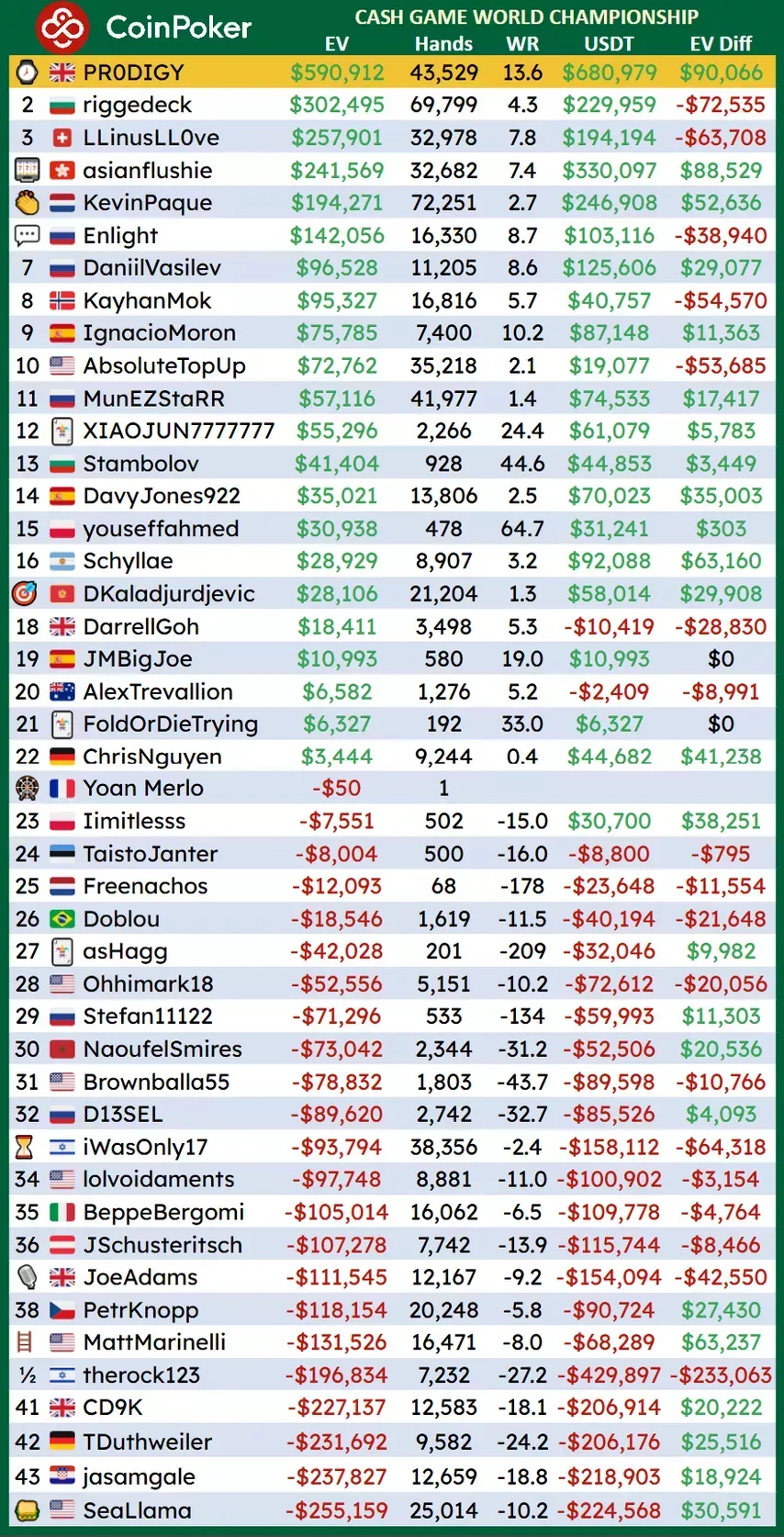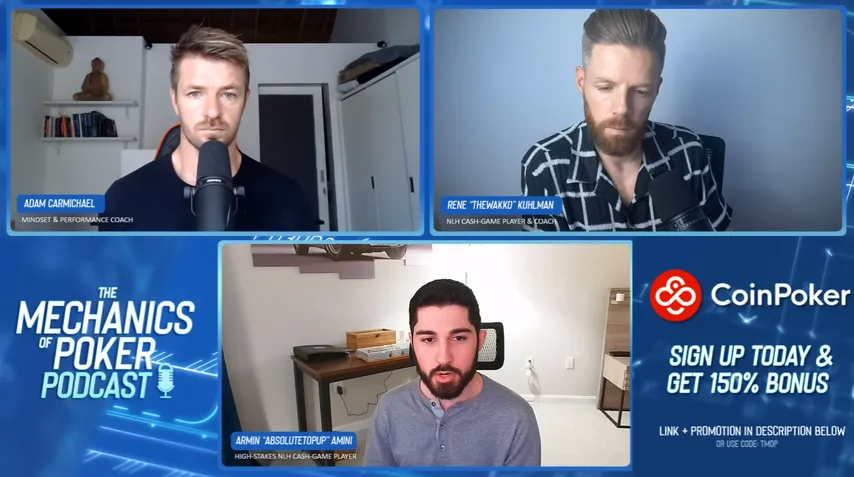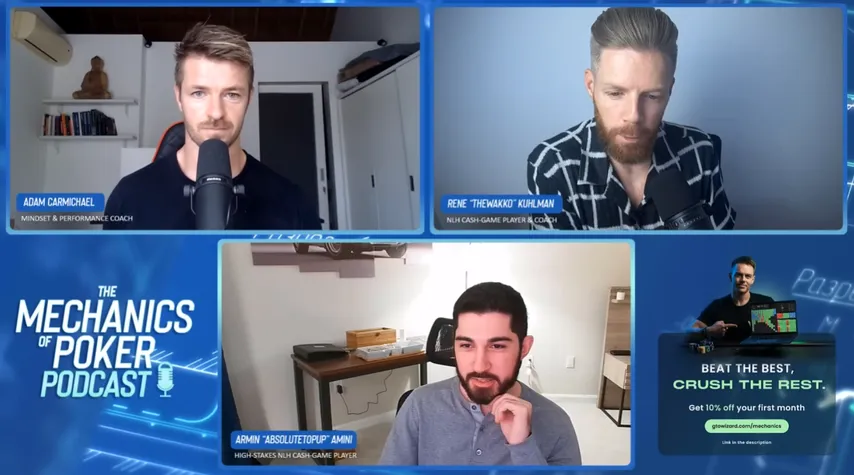– Armin "AbsoluteTopUp" Amini was first noticed railing the recent cash game World Championship, which for our audience listening was the Cash Game World Championship hosted by CoinPoker. In this event, they opened rake-free $50/$100 tables, attracting the best of the best, battling it out day in and day out to be crowned the champion of online 6-max No Limit Hold'em cash games. Big established names showed up, think of Linus, DavyJones, Barak, MunEz, etc., but also some new and less established names that came to play and make a name for themselves.
In our questionnaire, Armin, you describe participating and, in the first few weeks, even leading this event as one of the high points in your career. While you're no stranger to battling, having played a fair amount over at ACR $50/$100 against the best of the best, it must have been a big step up for you.
In this podcast today, we will cover how you got there, but first, I want to dive in here—what kind of motivated you to participate in this event?
– So, initially, I wasn't really sure whether I was going to play or not. I was kind of mulling it over, you know? So I put one foot in and was like, "Ah, I might play." So I joined the Discord without full intentions of playing. I was like, "Oh, I might," and then I just thought it over. I looked at some of my results in reg battling over the years, and $5k ACR is is not all that different from a lot of the lineups that I played in the Cash Game World Championship. Maybe it was a little bit softer, but I joined thinking I have an edge or some type of edge. And if I just keep my head on straight, I might be able to do well.
– Did you have any expectations or goals starting in?
– I always set my expectations very high, so I went in there trying to win and at least place very well. Yeah, that's what I was expecting, and I got close to what I was expecting, so I can't complain too much.
– Then, actually, on day 15, the game humbled you and sent you down to fifth after having a $110,000 losing session.
– Oh yeah, I've had some really bad sessions. I think for like a week straight, I had sessions where I got on and instantly lost five buy-ins, and then I slowly lost a few more after that. So I think there were at least three sessions where I got on and lost like $80,000 to $90,000 in the first two or three hours. And then, uh, the one you mentioned—I didn't really climb out of it—but the ones after had pretty much the same exact start as that one. And then I just played like eight hours and clawed my way back to even or like down $10 or up $10—something negligible. So it was like a bit of a grind in the middle.
– How does that affect your mental game and your confidence going in?
– Not really. I kind of just went into it thinking, "You know, it's very likely or possible that I just lose 20 buy-ins or 30 buy-ins and I'm in the hole." So like, when my mindset whenever I sit down at a table is, "This money is as good as gone." You go in there with, uh, well—I said my expectations are high—but I'm aware of what can easily happen.
– Looking back at the event, how do you feel about it overall? Any takeaways?
– Honestly, I kind of just learned that I'm still maturing as a poker player.
– What evidence pointed that out to you?
– Just variance hitting you. Like, you know your play isn't always going to be your best. So like, I try to play my best every time—I think I do a pretty good job of it—but you know when sessions get hard and you feel like there's a lot of pressure on you because you keep on just losing pots, you're always in a losing position—it feels like for stretches. Trying not to unravel during those stretches is not as easy as you might initially think, right?
– Any kind of habits that you have that you go back to to make sure you stay sane?
– Sometimes I wouldn't play as long of sessions. I just like end my session and try not to overdo it, right? You know, live to fight another day. That's kind of like my go-to—don't try too hard to just get out of the hole because you know that's one thing that I've probably done in the past a lot. And honestly, that's something I did for stretches in the challenge—I mentioned I was playing eight-hour sessions trying to get out of the hole. Me saying this is like the exact opposite of what I'm preaching.
– So what are signs that you're trying too much?
– Perhaps doing stuff that's just super marginal—a bit more than I should. You know, it's a low-frequency play, but I want to do it this time because if it works, I'm even.
– I definitely relate to this one. I'm sure a lot of the audience can relate to this one. When you're down, you just look up the variance a little bit more.
– You try to increase the variance and get unstuck. But as of late, I've done a pretty good job of staying in line—keeping my head on straight—staying in line—understanding that I can't win every pot and some I just have to concede sometimes. And it's the hardest to do that whenever you're on a downswing.
– Obviously it's called the World Championship, right? Then we're going to crown a winner—he's going to be the champion. Uh, how much do the results of this challenge indicate who is currently the best at six-max in your opinion? So basically, I'm asking—is Owen "PR0DIGY" Messere indeed the GOAT?
– Yes, I think it leads you in the right direction, right? So it gives you a good idea of what's going on. There's always going to be variance, but I think you know there's reasonable confidence in these players played a lot of hands on top. So, although there's variance, it gives you an idea of like, "Okay, this player is doing pretty well." I mean, there were players in the challenge that did very poorly, but I think they're really good players. And you know, I saw a lot of the showdowns, and a lot of them were show tables too. So I'm like, "Oh, this guy is running terrible." So, maybe the results don't indicate how bad he's doing or how good he is.

– Who, beside Owen, stood out to you in terms of giving you a tough time?
– Well, that was the first time I put in decent volume versus Linus, and, uh, pretty exhausting playing him for several hours. I'd say he was very tough to play against.
– What makes a person—a player like Linus or someone at the top—tougher to play against?
– It just feels like he's always betting, so I feel like I always have to have a decision against him, right? I don't get to have a street off sometimes—you're like, "Oh, please check." But no, he just bets.
– So, you mentioned that you go through phases where you fall in love or out of love with poker—what do you do when you fall out of love with poker to get back into it and get that fire going again?
– Man, that's a tough question. I would say, for me, having those results to go along with it definitely helped. In the beginning, just constantly leveling up in a sense—like, you know, I started at NL10, now I'm at NL25—so getting that jump gives you great motivation to keep on going. Essentially, when you start hitting plateaus, it kind of forces you away from the game. You kind of need to keep on setting new stepping stones to keep on going up.
So, I'd say I kind of fell out of love with the game probably around mid-2023. That's essentially when I broke routine. So, that meant I was studying very often—I was marking 30 to 40 hands a session, not reviewing all of them, but reviewing most of them—and working really hard. And then when I fell out of love with the game, I just stopped studying it completely, right? It took a while to kind of reignite that flame, I guess.
For about a little over a year, I didn't study at all. And you know what? I kind of coasted, right? I was like, "Okay, I'm doing well—uh, I'm winning—but I don't think I really care to get better right now." So I just played for a while. I'd play mass tables like 10 tables at a time, just on autopilot, and get off without studying. So that's what I was doing for a while.
To get out of that, you know, I kind of just decided I need to get my stuff together. I started studying again about October.

– So, trying to get back on the horse, that was in October. I guess then hearing about the challenge came at a good time.
– Yeah, so it was really convenient because I started cutting down my tables—now I only play like six tables maximum—and studying as much as I can, you know, as much as I can tolerate. Because I was really passionate about studying a few years ago, there's a lot more to learn, and you know, there's still a lot to learn, but it's much more obscure than before. So now, I study and try to take away what I can.
But I've started doing that in October, and then the results were coming back really well. I think I had a pretty big upswing since the start of October on whatever I basically played. And then about a week and a half before the challenge, SeaLlama's like, "Hey, we're gathering all these high-stakes players—are you interested?" And I'm like, "Uh, maybe." And then he invited me to the group.
– How long did it take for poker to take up more time than your studies?
– Not long, honestly. Because of COVID, I basically got into poker a little bit after COVID started. We were basically on lockdown, and my first year of college was online. Honestly, that might have been the reason, because a lot of my classes were online. So I would just show up to class, class would be over, and then I'm already on my computer. I hopped on poker, and because of COVID, this was when I was playing like $50 NL. I would play like eight hours a day, and that was really helpful in getting better.
– Did your friend help you out in terms of getting started with strategies? How did you first come across like strategies that you were implementing, or were you just winging it, or did you have some prior experience?
– This is a good one. So, he gave me like $100, said he'd stake me so I could play poker. Without that, I don't think I actually would have played. I didn't have money; my parents had money, but I didn't have anything. I just had a computer. So, he staked me, and then I'd send him hands that I had questions about, and we kind of discussed them. He is notorious for never using a solver, so we would kind of just brain-solve stuff together. I didn't even know what a c-bet was. He would basically tell me everything he knew and tried to guide me in the right direction.
– I saw a post on your Twitter. I think it was the summer of 2021, where you said "200 Blitz is where boys turn into men," which two months later was corrected to "500 zone."

What changed as you went from a boy poker player to a man, and how did the 200 Blitz and later 500L Zone grind catalyze this change?
– Hopefully, I'll try to remember this the best I can. Tricho, back then, he was staking me, and he was like, "Try to play in games with fish," which is a very smart thing to say to someone who's not very good and who's trying to learn how to play. Because playing in tough games isn't going to win me money or get me better—it might get me a little better, but it's definitely like plateauing me as far as results go. So, I was never really that good at game selecting, but you know, I would try because he'd encourage me to, because he was staking me.
Eventually, I got off stake and just started playing 200 Blitz on my own because I mainly was playing untracked sites, and I wanted to play tracked sites with graphs and statistics because I knew it was good for my improvement. I think that's eventually when I started dabbling with solvers.
– What was the catalyst to using solvers?
– I kind of just thought that up to that point, not having ever used a solver, I was doing like, I think I was winning small on like $500 NL on American sites, and you know that was nice and all, but that's not very inspiring results for someone who's trying to become as good of a poker player as possible. And I knew that not using a solver would really limit my game.

– So, you opened the solver..
– I had no idea what I was doing
– From the outside looking in, if you just managed to get to that level with his advice and you just started playing, I would almost be afraid that the solver would then destroy your natural talent for the game. I've heard many of these stories, right? Where people are actually doing well, and solvers kind of destroyed them in a way because, yeah, it's all about how to interpret that information.
– It kind of did destroy it in a sense—well, not exactly, but after I started using a solver, I hit a plateau for months or even went down a bit, and I wasn't doing as well. It took a while; it's a pretty big learning curve, honestly, just opening a solver and starting to try to apply strategies that the solver is recommending.
– What did you stop doing that was actually making you win?
– I was probably doing a lot more marginal stuff—lot more marginal aggression. I think I was probably intuitively more passive because I wasn't using a solver at all. I think I was on the more passive side while moving up, and then like opening up a solver and saying, "Wow, this is way more aggressive than me—I have to be more aggressive." That's not enough; you got to take it in a more sophisticated way than just, "Oh, I need to be more aggressive."
– Did you have a plan B when you were going through this downswing? Did any thoughts crop into your mind of returning to your studies or normal life?
– Yeah, no—I thought that maybe I should just focus on school, but whenever I would win in poker, I enjoyed it so much that I kind of didn't let myself get away from it. And you know, I just kept on trying, and then it eventually worked out for me.
– You said you learned lessons about bankroll management during this period. What other lessons did you learn about yourself?
– Maybe my mental game isn't as strong as I thought it was, but I've never—I get asked mental game questions from students, and I tell them I'm not the one to ask because whenever I'm not feeling great, I just still play for the most part. I don't take very big breaks. I think the biggest break I took was like two weeks during a stretch at like $200 NL, and then I just been playing almost non-stop since.
– You say you're not the one to ask, but you're the exact person to ask because you're able to feel what other people feel but override it. How do you get yourself to keep showing up? What's the kind of inner dialogue that you use to make yourself be there?
– I maybe delude myself—I just keep on playing, thinking, "I can win—I see what's happening, but I can figure this out. No more mistakes." I just keep on playing. Maybe I'm a little tilted, but let's keep on going. Uh, I'm one—like, at least I like to think—maybe I'm delusional, but you know when I'm tilted, if I'm tilted, it doesn't hurt my play that much to drop me from like an A to a C, its like an A to like a B-minus. And that's what I've just been doing.
– What's this kind of B-minus game? What's the experience of your B-minus game as you're living it and playing it?
– I'm definitely less emotional—I try not to be, but you know it's almost impossible to not just be stoic the whole time. You know, I try my best to be stoic, but there's going to be sessions where you know the emotions creep in. But when, like you said, uh, everything's going like fine—and I'm in it—you know, each decision just becomes its own and doesn't get affected by previous ones. So, which is uh—well, in non-information-wise, like I'm speaking emotionally.

– I think you were playing Devil's Advocate with yourself and kind of testing out your ideas?
– Yeah, so you know, a lot of the time I take what I feel like is happening at the tables and I just throw it in the solver and I start node-locking. So I have my initial thoughts, I have the counter-strategy to those thoughts, and then I kind of stress test them both. And then I go with what I think is the most realistic to what I can do to win in practice.
– You want to basically try to get that strategy not to work. And if you cannot get the strategy not to work, then your strategy is pretty damn solid.
– Well, you know, the way I use solvers is I try to base it off assumptions. A lot of time my assumptions are right, but there are times where they aren't. And honestly, what I found is bouncing ideas off friends—off other players that I have studied with—I mean, there were stretches in my career where me and SeaLlama were study partners. I think that was probably in 2022; we studied together for months. And then uh, we kind of grew apart—I started hanging out with my Call of Duty friends more; I think he started playing a lot more live in Vegas.
– What does a day-to-day in the life of Armin look like when trying to become the best poker player?
– Not a lot of free time, so I was a full-time student back then. I'd have like 17 to 18 hours of classes picked out for the semester. So that means waking up, going to class, doing my homework, and then getting on poker. And that was essentially my day-to-day routine—it was very simple, bland, not much thought into it other than, "I got to get this school stuff done so I can get back and work on poker."
– How does your day-to-day look nowadays?
– I've done a lot more work on my health. I don't eat out as often anymore. I eat homemade food, work out pretty often, and I don't play as many video games, so I don't waste time behind the computer outside of just playing poker. And just hanging out with my friends—I started taking Jiu-Jitsu earlier this year, but I kind of stopped because I started focusing really hard on poker again. Now, I'm trying to find that balance again, so I'm about to start going again.
– What are the most common mistakes you notice in your students?
– Everyone wants to win big pots, and they don’t pay attention to small ones. But it is the latter that are much more common, and in them, players simply give away money, especially at low stakes.
– How to fix this?
– You always need to play with full concentration. Often the problem is that players act too passively in such situations and allow their opponents to outplay them. You need to put your opponent in an awkward position more often, make them play a guessing game.
– What do you think is the greatest contributor to your success in poker?
– Risk management. Because in the beginning, I wasn't very good at that, and I think the best thing I did for myself was take a more conservative approach as far as bankroll goes. And that helps me with aggression while playing in poker. So, like, I might be conservative outside of poker, but while I'm working at the tables, it kind of allows me to disconnect from that part of life. You know, I'm just focused on poker; I don't have to worry about anything else. And I think, like, I've always given the advice of, "Hey, if you're not comfortable playing—there's outside reasons for that." And for me, it was bankroll management.
– What would you see as the most important lesson poker has taught you that you've learned along the way?
– Honestly, the most important lesson it's taught me is like if I work really hard at something for long enough—like it's almost like the 10,000 hour rule—if you work at something hard, efficiently, like correctly, you're not just hitting a brick wall and going right, just running into it the whole time. If you work on a skill for a very long time and stay consistent with it, you will get results—it's inevitable.
– What would you say to that type of player? I'm sure there are many of those listening who feel like they're putting in the work, but for whatever reason, the results aren't coming for years.
– When you're in a situation like that—you've been at it for two or three years, but you feel like you've hit a plateau for a long time—and you feel like you're working hard, but maybe you're not working smart. I guess that's when, like, if I was in a player like that's shoes, I would get other people's opinions. Maybe my Devil's Advocate isn't even working for myself, right?
– Do you feel like anyone can make it to high stakes?
– Yeah, I think it's definitely possible—like hard work beats talent most of the time, hopefully. But yeah, I mean, if you work tirelessly towards something for a very long time, for years, you're going to get some results. And if you aren't, I would say very likely you made some type of mistake on the way.
– Why do you feel like many players don't believe that's true, or from a different angle—why do you feel like a lot of players say they want to play high stakes but then they get stuck along the way, and then the narrative becomes, "It's too hard, it's not possible"?
– Well, you know, it's really easy to get discouraged whenever you're playing poker. I was lucky in a sense because, you know, I had problems with shot-taking when I was trying to get up to $500—I would get shot back down more than once. But then I hit a period of just running hot, and I ran up—I shot took $1,000 successfully, $2,000 successfully, $3,000 successfully, $5,000 successfully—all in like the span of a year.
But while that happened in a year, for two years leading up to that, it was just all back and forth—plateau. I'm just going up and losing, going up and losing, going back to the drawing board over and over again. So, you know, at some point, you kind of think maybe you're going insane—maybe you have a little bit of mental illness that you keep on trying.
– Your goal is to become the strongest. What do you lack, what do you plan to work on in the near future?
– A couple of years ago I made a decision to focus on small pots and I still follow it. During the cash game championship I also realized that I lacked experience playing deep stacks. In one session, I gave away a 500bb stack.
– How do you see the future of poker, and how do you see yourself in it?
– I think poker's getting harder as a whole because it's so much easier to get better nowadays. I mean, I think two, three, four years ago, you couldn't just load up a cloud-based solver and have a single range pot loaded up right in front of you in the span of 10 seconds. You'd have to run a PioSOLVER—your computer would need to have enough RAM—and it would take 30 minutes, an hour maybe, to run. You'd have to sit there and wait, and you couldn't cover much; you'd have to cover a single spot. Now, you have access to every spot in poker pretty much immediately.
So, everyone's getting better; the edges are getting smaller. And although you still can carve out an edge at the top and versus the better players, everything's getting more and more competitive. So, it's going to become definitely harder.
I see myself doing fine as long as I keep on working. People are going to catch up, and the only way to keep them from catching up is sharpening my tools.
– Any live poker ambitions?
– I've probably played like 40 to 50 hours live in my lifetime, and I think it's fun, but I only ever go and play live if my friends are doing it. And even then, I don't go all that often. I had good experiences live; I think it's fun to socialize at the table—it's a different aspect because you don't really get to do that online.









